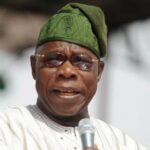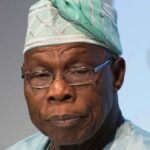The spokesperson of the All Progressives Congress (APC) Presidential Campaign Council, Festus Keyamo, during an interview with Arise TV on January 16, 2023, said the highest inflation rate in the history of Nigeria was recorded under the former President Olusegun Obasanjo administration.
“This is not the highest inflation rate. In 2005 under Obasanjo and Atiku, we had a 28 per cent inflation rate. Under Obasanjo and Atiku, we had the highest. Go and fact-check me,” he said.
Opposition parties have been making false statements without verification since the kick-off of campaigns, but with few weeks to the 2023 general elections, the rate at which these claims keep coming in is alarming.
However, the heat between the APC and the Peoples Democratic Party (PDP) is like no other due to their long rivalry.
- Demand for coconut seedlings increasing – FG
- Inside the 3,000-year-old palace of Prophet Daud, Suleyman
Background
Inflation is the persistent increase in the prices of goods and services, which translates as a decline in the purchasing power over time.
According to Nigeria’s inflation historical data, the Obasanjo administration experienced an increase at some point, but as at 2007 when they left office, inflation rate was 5.39 per cent, which showed an improvement from when they were sworn in as president in 1999 when the inflation rate was 6.62 per cent.
The inflation rate in Nigeria experienced a rise at different points in the current administration, as well as an all-high in November 2022 at 21.47 per cent. The National Bureau of Statistics (NBS) attributed it to a sharp increase in demand as December was around the corner, import cost hikes due to the depreciation of the naira, and a rise in production costs.
In December 2022, the inflation rate showed a decline of 0.13 per cent compared to November. However, on a year-on-year basis, the headline inflation rate was 5.72 per cent, points higher compared to the rate recorded in December 2021, which was 15.63 per cent.
A breakdown of inflation figures, year-on-year showed that the inflation rate at the end of 2015 was 9.01 per cent, the same year the Buhari administration kicked off.
In 2016, at the thick of recession, it skyrocketed to 15.68 per cent, and in 2017, it further moved up to 16.52 per cent. It, however, slowed to 12.09 per cent in 2018, and later, 11.40 in 2019, then rose to 15.75 per cent in December 2020.
In 2021, the inflation rate rose for the first time in eight months to 15.63 per cent. The reason was also attributed to high yuletide spending.
Inflation rose to its highest level since 2017, rising from 16.82 per cent recorded in April 2022 to 17.71 per cent in May, according to a Consumer Price Index report by the NBS.
On the debt level, as at 2015 before President Buhari took over power, Nigeria’s debt revenue stood at N8.8trillion, according to the Debt Management Office.
However, recent statistics from the DMO showed that Nigeria’s debt skyrocketed from N8.8trn in 2015 to N44trn in the third quarter of 2022.
The country’s debt rose from N39.56trn in December 2021 to N41.60trn in the first three months of 2022 alone.
Also, fuel price when the Buhari government started stood at N87 per litre. As at May 2016, it had moved to N145 per litre, representing a 66 per cent increase.
In 2020, it was further reviewed upwards to N162 per litre. In the same year, the product sold between N165 per litre and N220 at fueling stations. This was further compounded by the unavailability of the product, with the major oil marketers saying they could not continue selling fuel at N165 per litre. Currently fuel price is over N200 per litre.
Also, in 2015 when President Buhari assumed office, the dollar was exchanged at N198/$ in the parallel market. By 2018, it was N306 to the dollar, and in 2019, it went up to N360 to the dollar and eventually exchanged at N520 in 2021.
From 2021 till date, the dollar at the parallel market is exchanged between N732 and N755 to a dollar.
Similarly, the consumer index price of food increased to 590.2 in December 2022. The CPI measures changes in the price level of the market basket of consumer goods and services purchased by households.
The unemployment scene also rose in the last quarter of 2015 at 10.4 per cent according to the NBS. The figure went up to 14.2 per cent at the end of 2016. At the end of 2017, it moved up to 20.42 per cent and 23.1 per cent in 2018. The latest figures from the NBS indicate that the unemployment rate now stands at 33.3 per cent.
Lastly, we examined the breakdown of Gross Domestic Products (GDP) figures from the NBS and the World Bank from 2015 to 2020 and it showed that Nigeria’s GDP in 2015 when President Buhari assumed office stood at $486billion; it declined to $404bn when the country slipped into recession.
In 2017, GDP figures further declined to $375bn. However, in 2018, as the economy began to recover, the figures improved to $397bn. In 2019, the figure surged to $448bn.
By 2020, in the heat of the COVID-19 pandemic, which affected virtually every sector of the world economy, Nigeria’s GDP figures declined to $432bn.
The GDP figures were estimated to have risen to $440bn in 2021, with 3.98 per cent growth of the economy, although official figures by the World Bank are still being expected.
Verification
The former president, Olusegun Obasanjo and his vice president, Atiku Abubakar, ruled between 1999 and 2007. The economy experienced a rise in the inflation rate to about 18.87 per cent with an annual rate increase of 11.94 per cent.
However, a report by WorldData info reveals that the highest inflation in Nigeria was recorded in 1995 during the late General Sani Abacha regime at 72.84 per cent with an annual rate increase of 15.80 per cent.
Similarly, other reports and data on the inflation rate in Nigeria showed that 1995 was the highest before Obasanjo assumed office in 1999.
Conclusion
Based on investigations and verifiable data, fact-checkers at Daily Trust can confirm that the claim by Festus Keyamo suggesting that Nigeria’s inflation rate was highest during the Obasanjo administration is false.




